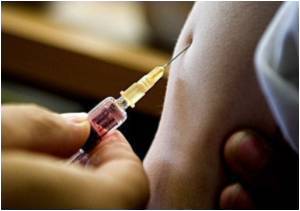Vaccination strengthens an individual’s immune system to help prevent morbidity and mortality from infectious diseases. Vaccines can also prevent the spread of communicable diseases. Ideally, all women should have their immunization status up-to-date prior to conception. However this goal is difficult to accomplish taking into consideration that many pregnancies are unplanned.
Unless the potential risks outweigh the clear benefits, live vaccines should not be administered during pregnancy because there are theoretical concerns for fetal harm. But till date there is no evidence of teratogenic effect of any of the live vaccines- measles, mumps, rubella, varicella or polio. Similarly in the case of live-attenuated vaccines, the risk of insufficient control of replication of the vaccine strain is only theoretical which has not been proven yet.
Another concern regarding immunization in pregnancy is a mercury-containing compound (thimerosal), which is used as a preservative in vaccines. Studies have shown that the breakdown product of thimerosal- ethyl mercury does not accumulate and does not cause harm to the fetal brain like methyl mercury. Also there is no increase in neurodevelopmental disorders due to exposure to thimerosal-containing vaccines. Now a days all vaccines, except the Japanese encephalitis vaccine have a thimerosal-free alternative. But unavailability of a thimerosal-free vaccine should not preclude administration of the vaccine.
Vaccination in pregnancy
• Hepatitis B- Ideally women should be vaccinated for Hepatitis B prior to pregnancy. But due to some reasons if they are not immunized for Hepatitis B and are at a high risk for Hepatitis B and have tested negative for the virus can receive this vaccine. Vaccination protects mother and baby against hepatitis B infection both before and after delivery.
• Influenza- This vaccine can be administered only after 14weeks of pregnancy. In case of serious medical condition, which can lead to flu-related complications, the vaccine can be given at any stage during pregnancy. Maternal vaccination during pregnancy has the potential to decrease the probability of neonatal influenza. In 2009 when the H1N1 influenza vaccine became available, pregnant women were among the initial target groups for immunization with this inactivated vaccine.
• Tetanus - This vaccine is routinely recommended for pregnant women.
• Hepatitis A- The safety of this vaccine is yet to be determined. The available data on the safety of this vaccine is very limited. Though pregnancy is not a contraindication, women at high risk should discuss its health implications with their gynecologists.
• Polio Vaccine- So far there has been no adverse outcomes with the inactivated or live-attenuated oral polio vaccines (OPV) when administered during pregnancy. But it is better to avoid the vaccination on theoretical grounds unless necessary. However if a pregnant woman does require immediate protection, then the live-attenuated form of the vaccine may be considered.
• Measles, Mumps, Rubella (MMR) – Every woman should receive a shot of the MMR vaccine at least 3-months before conceiving. This vaccine is contraindicated during pregnancy and if a woman is non-immune to rubella then it should be given after delivery. Unintentional MMR vaccination during pregnancy is not a reason for termination of pregnancy.
• Varicella- The varicella vaccine is recommended at least 4 months prior to conception. It is contraindicated during pregnancy. In non-immune women it should be given in the post-partum period. However accidental vaccination during pregnancy is not a ground for termination.
Certain new vaccines are being developed which can be administered during pregnancy for the maternal and fetal well-being. These vaccines are the congenital cytomegalovirus (CMV), vaccines against malaria, vaccine for Group B Streptococcus (GBS) infection and vaccine for the respiratory syncytial virus (RSV).
However there is not a single vaccine, which is specifically approved by the FDA for use during pregnancy. This is primarily due to the absence of industry-sponsored trials in pregnant subjects. Therefore future vaccine trials must include pregnant women, especially when a particular vaccine is indicated during pregnancy.
Source
Women's Health. 2011;7(1):109-119
Source-Medindia















